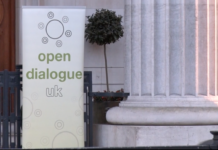“Meditation Plus Running as a Treatment for Depression”
“Meditating before running could change the brain in ways that are more beneficial for mental health than practicing either of those activities alone,” Gretchen...
Exercise Effective for Early Psychosis, Studies Show
A new study out of the University of Manchester found that personalized exercise programs reduced the symptoms for young people suffering from their first episode of psychosis. Researchers also conducted an accompanying qualitative analysis and found that the participants experienced improved mental health, confidence, and a sense of achievement and felt that autonomy and social support were critical to their success.
Love is Dialogical: The Open Dialogue UK International Conference and Training
In the past five years, there has been a dramatic explosion of interest in the Open Dialogue Therapy practiced in Tornio, Finland. It is a humanistic “treatment” that has produced five-year outcomes for psychotic patients that are, by far, the best in the developed world, and there are now groups in the United States, Europe and beyond that are seeking to “import” this care. However, the challenges for doing so are many and, last month, Open Dialogue UK - on the occasion of the first-ever fully recognized Open Dialogue training outside of Tornio - organized a conference in London to hold an open dialogue about Open Dialogue.
New Study Examines Successful Discontinuation of Antipsychotics
A new study to be published in the next issue of Schizophrenia Research examines patients suffering from a first-episode of psychosis who stop taking any antipsychotic drugs. The researchers attempt to identify variables that can serve as predictors of the successful discontinuation of antipsychotics. They find, for example, that those who discontinue the drugs have, on average, the same outcomes as those who stay on them, and that those who have better social integration are more likely to discontinue without relapse.
Video: “Antidepressants Made Things Worse”
BBC news conducts a video interview with a young man named George. He was prescribed antidepressants when he was 15, after only a five-minute...
“To Stop Trans Kids from Killing Themselves, Shocking Study Says ‘Accept Them’”
“The transgender community has disproportionately high levels of depression and anxiety,” Diana Tourjee writes for Broadly. “A new study shows that trans kids who...
“Toward a Social Justice Therapy: Let’s Keep Talking”
Can psychotherapy help dismantle oppression? “Social justice focused, analytic therapy- the kind of therapy I strive to do- is one that can support the...
“Reducing Future Suicide Attempts by Forging Connection”
A new study published Tuesday in PLOS Medicine may offer evidence for an intervention for people who have already been hospitalized for a suicide attempt. The...
Flibanserin’s ‘Effects’ Do Not Outweigh Harms, Review Finds
Despite concerns about the risk to benefit ratio, the FDA approved flibanserin (Addyi) to treat low female sexual desire in August. In a new...
A Conversation about Having Conversations about Psychiatry
In spite of constantly increasing opportunities to tell different stories to the canonical story of bio-psychiatry, it can be risky for academics to voice a different perspective than the mainstream model of mental illness. In this conversation, a communication professor and a psychology professor discuss their challenges and personal experiences with going against the grain, such as what it means to be labeled “anti-psychiatry” by colleagues and responding to students upset to learn their medications may not be all they thought they were.
In Case You Missed This
On November 12th, 2015, the third anniversary of the day that I abruptly stopped taking benzodiazepines, my dear friend, J. Doe, published a two-part article here on Mad in America examining the language that is commonly used to describe benzodiazepine (benzo) iatrogenesis. I wanted a summary of these articles captured in a Youtube video so that those in the thick of benzo neurotoxicity could tune into these ideas in a way that might be more easily digestible. I hoped more benzo sufferers would begin to question how they describe (and allow others to describe) an illness that remains decades behind in understanding and recognition. I also wanted to draw attention to the content again in hopes that more medical professionals would read and understand the crucial distinctions in language surrounding this problem.
Troubling Mental Health Nurse Education
Mental health nurse education in not sufficiently critical of institutional psychiatric practice. Its formal curricula in universities are often undermined by the informal curricula of practice environments. As an institution, mental health nursing pays insufficient attention to both these issues because it is an arguably un-reflexive and rule-following discipline.
Einstein, Social Justice and The New Relativity
To create his theory of relativity, Einstein had to see things differently. He used imagination and empathy to come to know a new 'reality' of existence. In this essay, we delve deeply into the nature of human experiences that lead to public concern and discover ourselves in a whole new realm.
The Future of Mental Health Interview Series: Eleanor Longden
The following interview with Eleanor Longden, who is well known for her Ted Talk and her activism in the psychiatric survivor movement, is part of a “future of mental health” interview series that I’m currently conducting on my Psychology Today blog Rethinking Mental Health. To see the full interview roster, please visit
http://ericmaisel.com/interview-series.
Family Oriented, Home-Based Treatment Best for Youth with Symptoms of Psychosis
A pathbreaking new study out of Finland suggests that early intervention programs for youth experiencing psychotic-like symptoms may see the greatest improvement when treatment works within the home rather than in a hospital setting. The research, to be published in next month’s issue of Psychiatry Research, found greater improvement in functioning, depression, and hopelessness among teens in a new need-adapted Family and Community oriented Integrative Treatment Model (FCTM) program.
“Early Behavior Therapy Found to Aid Children With A.D.H.D.”
“Children with attention-deficit problems improve faster when the first treatment they receive is behavioral therapy — like instruction in basic social skills — than...
Are Antidepressants and Psychotherapy Really Equally Effective for Depression?
A recent review of the evidence by the American College of Physicians (ACP) determined that cognitive behavioral therapy and antidepressants had similar levels of effectiveness for the treatment of depression. In a critical commentary for the Journal of Mental Health, however, Michael Sugarman from Wayne State University challenges these findings. Pointing to differences in research settings and clinical practice, Sugarman asserts that “these head-to-head comparisons are heavily biased in the direction of psychiatric care.”
Doing It Alone Together: Core Issues In Dutch Self-Managed Residential Programs
For the last six years we, a group of researchers, social work students, peer experts, and social professionals associated with the Amsterdam University for Applied Sciences, have been studying and facilitating the development of self-managed programs in homelessness and mental health care in the Netherlands. With our research we want to contribute to the development of new and existing programs through critical reflection. With this blog, I hope to share some of our findings, to give back to the respites from which we learned so much.
Rethinking Public Safety – The Case for 100% Voluntary
It is time to create an entirely voluntary psychiatric system. International conscience is clear. The singling out of people with psychosocial disabilities is not worthy of a free society. There are better, safer ways to address legitimate public needs.
The Evidence-Based Long-Term Treatment for Depression
While antidepressants are the most commonly used long-term treatment for depression, the efficacy of these drugs after one year is unknown. In a commentary for The Lancet, psychiatrists Rudolf Uher and Barbara Pavlova suggest that cognitive behavioral therapy (CBT) now has the most substantial body of evidence for long-term treatment for major depressive disorder.
Meditation and Exercise Reduce Depression Symptoms 40%
A combination of exercise and meditation done twice a week over two months may reduce depression symptoms by 40 percent, according to a new study published open-access this month in Translational Psychiatry. Following the eight-week intervention, the student participants that had previously been diagnosed with major depressive disorder (MDD) reported significantly less symptoms and ruminative thoughts and students without any such diagnoses also showed remarkable improvements.
Therapy Recommended As First Line Treatment for Depression
Following an extensive systematic review of treatments for major depression, the American College of Physicians (ACP) issued a recommendation to clinicians suggesting cognitive behavioral therapy (CBT) as a first-line treatment for major depressive disorder along with second-generation antidepressants. The results of the review revealed that CBT and antidepressants have similar levels of effectiveness but that antidepressants present serious side-effects and higher relapse rates.
Therapy Changes the Brain, Reduces Anxiety
After undergoing a nine-week cognitive behavioral therapy (CBT) treatment for social anxiety, patients show changes to both the physical structure of their brain and its activity, according to a new study published in Translational Psychiatry. The amygdala is most closely associated with the experience of fear and this study found that patients receiving CBT with reduced social anxiety had significant changes to this section of the brain.
“The Psychologists Take Power”
Tamsin Shaw, writing in the New York Review of Books, summarizes the most recent trends in psychology and moral judgement. From Skinner’s behaviorism to...
“The Surprising Reason Psychotherapy Works”
For Psychology Today, David Elkins writes that “psychotherapy's power to heal lies mainly in its human and relational aspects,” rather than any specific techniques...











